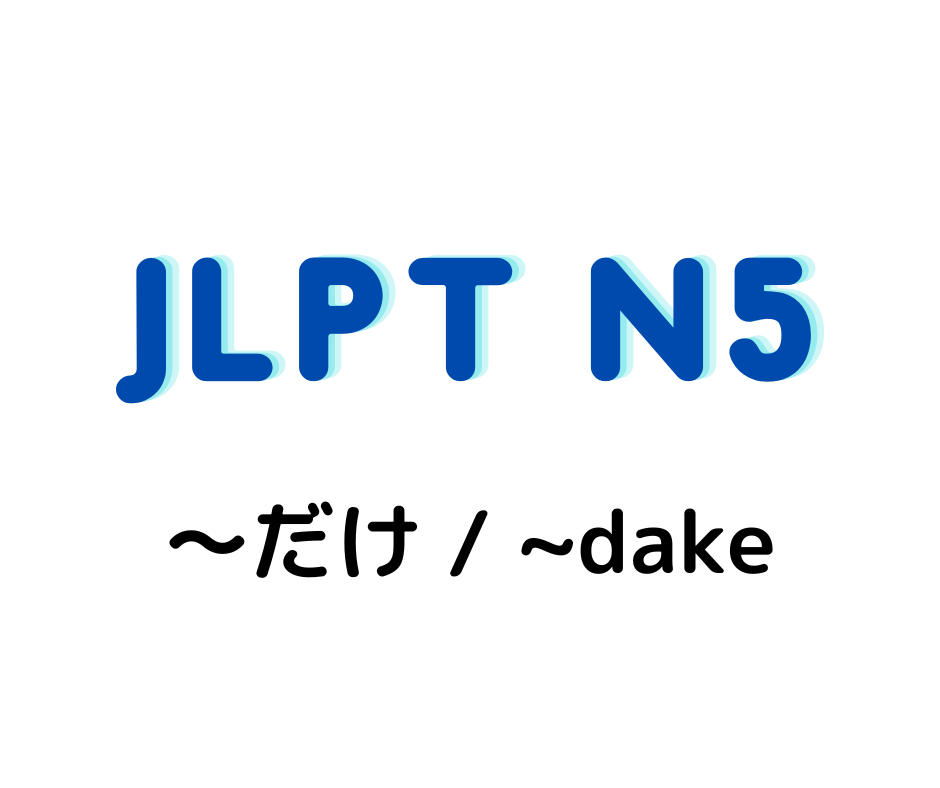sentence pattern: 〜だけ / ~dake
Grammar Type: Particle
Essential Meaning: Only / Merely / Just
onstruction:
- Noun + だけ
- E.g. クリスだけ [Only Chris]
- Noun + だけ + (が / は / を)
- E.g. クリスだけが / クリスだけを / クリスだけは [Only Chris]
- Noun + Particle (other than が / は / を) + だけ
- E.g. クリスにだけ [To only Chris]
- E.g. クリスからだけ [From only Chris]
- Noun + だけ + Particle (other than が / は / を)
- E.g. クリスだけに [Only to Chris]
- E.g. クリスだけから [Only from Chris]
- (Verb / い-Adjective) informal + だけ + (だ / です)
- E.g. 話すだけだ / 話しただけです [X only speaks / X only spoke]
- E.g. 高いだけだ / 高かっただけです [X is only expensive / X was only expensive]
- な-Adjective stem + (な / だった) + だけ + (だ / です)
- E.g. 静かなだけだ / 静かだっただけです [X is only quiet / X was only quiet]
- Potential form verb + だけ
- E.g. できるだけ [As much as one can]
NOTE
- だけ is basically equivalent to the English word “Only“. However, the precise connotation depends on whether だけ modifies a noun, adjective, or verb.
- When だけ modifies a noun, the associated particle is important:
- は, が, and を can optionally be dropped, but if they remain they must be placed AFTER だけ.
- E.g. スミスさんだけ(が)来た。[Only Mr. Smith came.]
- Other particles such as に, と, or で can NOT be dropped. They may be placed before or after だけ depending on the speaker’s intent. When the particle is placed before だけ, the sentence conveys a stronger feeling of exclusiveness.
- E.g. スシロだけに行きました。[I went to Sushiro only.]
- E.g. スシロにだけ行きました。[I ONLY went to Sushiro.]
- は, が, and を can optionally be dropped, but if they remain they must be placed AFTER だけ.
- With adjectives and verbs, keep in mind that だけ modifies the full preceding phrase rather than the single preceding word. Misplacing だけ can completely change the connotation:
- E.g. 魚だけを食べた。[I ate only fish.] Here だけ follows the noun 魚 and not the predicate 食べた, so the sentence conveys the idea of “The only thing I ate was fish“.
- E.g. 魚を食べただけだ。[The only thing I did was eat fish.] Here だけ follows the full phrase 魚を食べた, which conveys the idea of “I ate fish and did nothing else“.
- A potential form verb + だけ expresses the idea of “Do X as much as one can“.
- E.g. 踊れるだけ踊ろう。[Let’s dance as much as we can.]
- E.g. 食べられるだけ食べたい。[I want to eat as much as possible.]
Note the difference between similar sentence patterns
~しか(~ません) (JLPT N4)
Used when it is unfortunate or inadequate. (Negative)
[Explanation] “Shika” is only used in negative sentences.
~のみ(JLPT N2)
This is a formal expression for “only ~”.
Limit yourself to one out of many. The meaning of “only” is strong.
Example Sentences
スミスさんだけ(が)来た。[Only Mr. Smith came.]
僕にだけ話してください。[Talk to me only, please.]
私は日本へ一度だけ行った。[I only went to Japan once.]
雪子さんとはデートしただけだ。[I only dated Yukiko, nothing more.]
この家は大きいだけだ。[This house is big, that’s all.]
このお菓子は色がきれいなだけだ。[This candy has a pretty color, that’s all.]
できるだけゆっくり話してください。[Please speak as slowly as possible.]



コメント